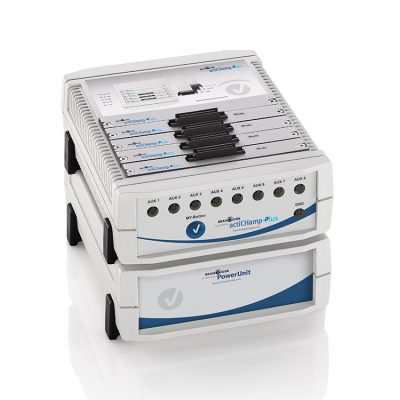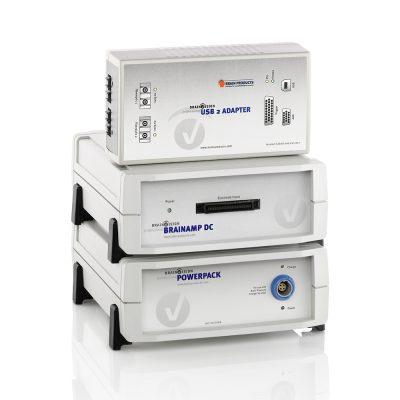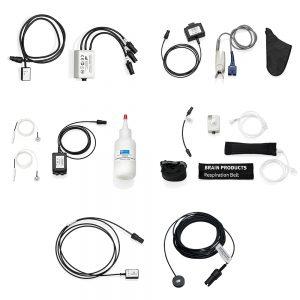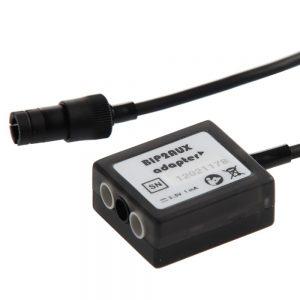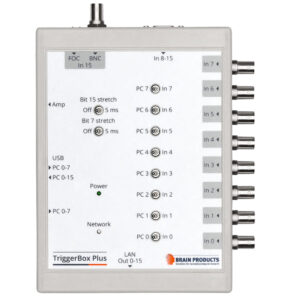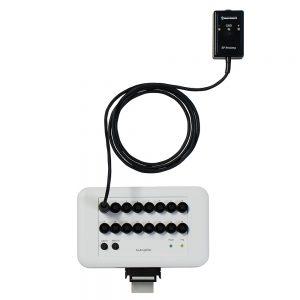StimTrak

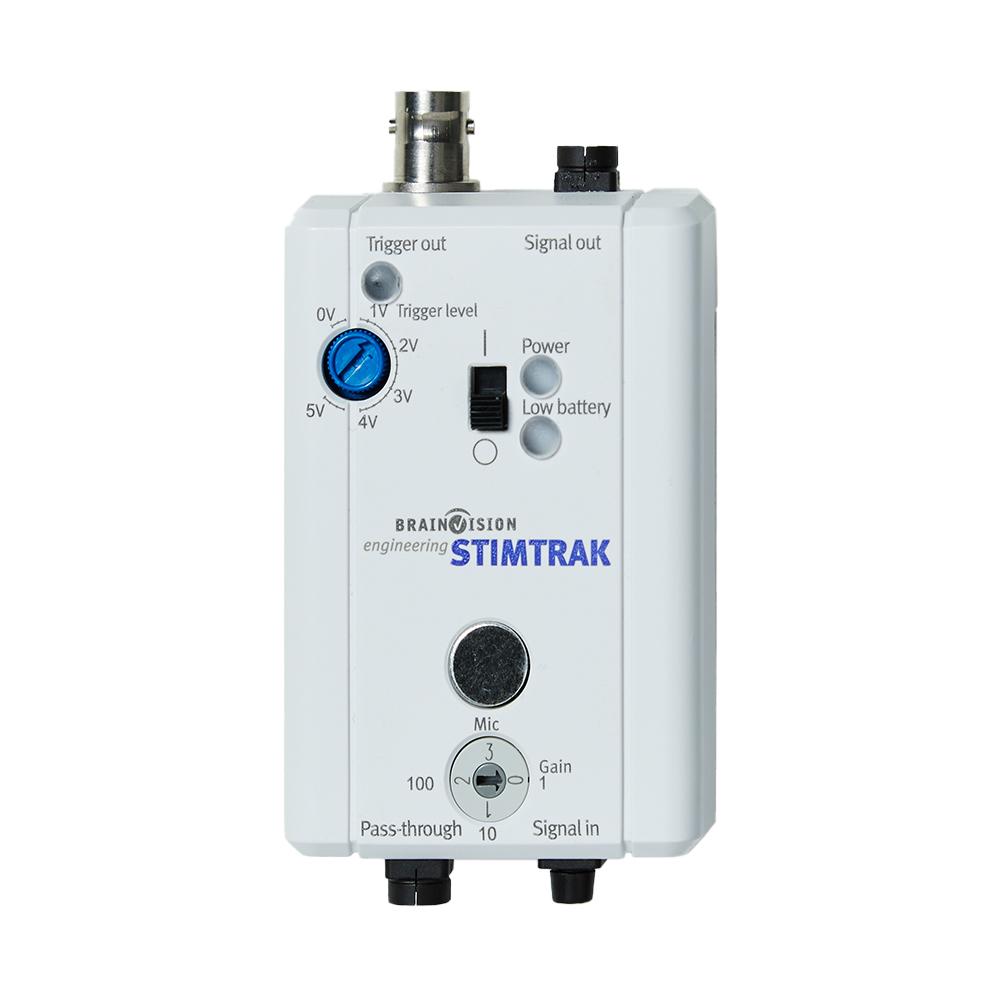
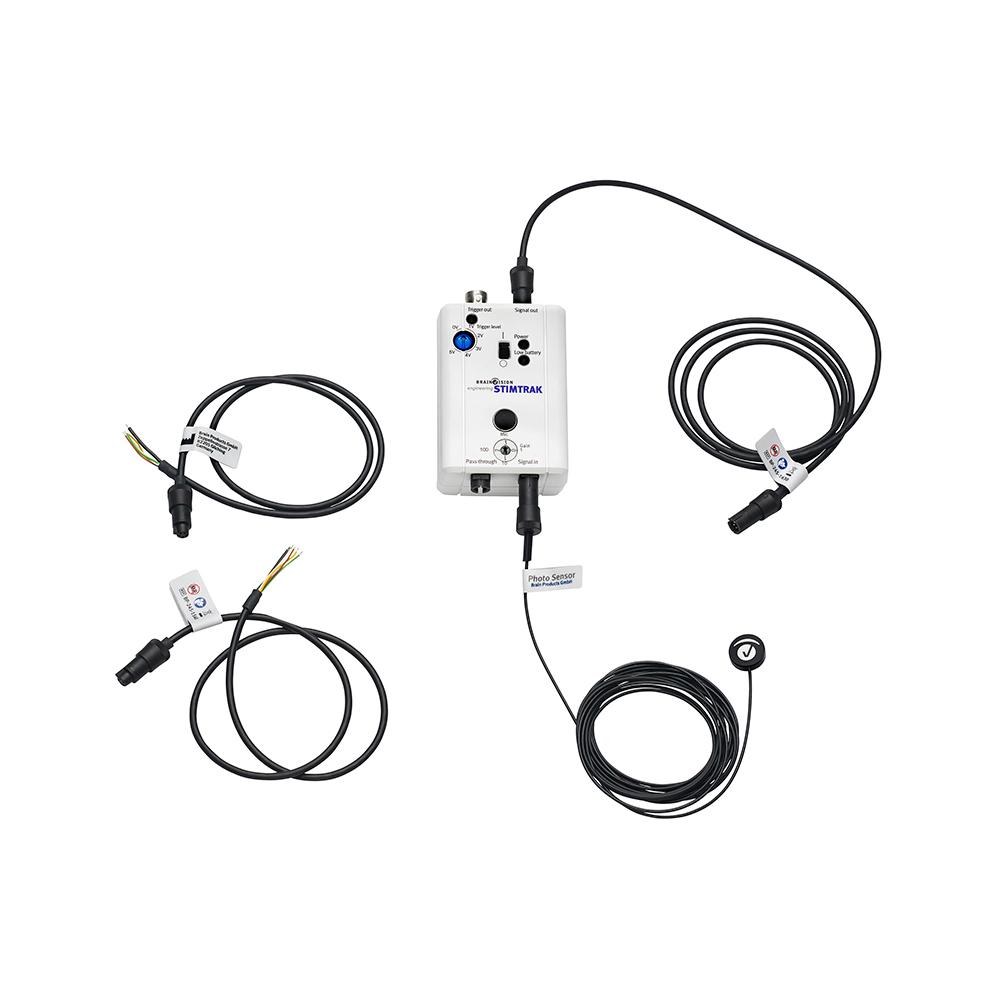
Offers inputs for various kinds of signals
Either forwards the signal with the same properties or with an amplification factor
Galvanic isolation guarantees safe measurements
Allows adjustment of a threshold level to generate a trigger pulse based on incoming AUX signals or acoustical events (e.g. clapping) by means of the built-in microphone
Precise tracking of stimulation onsets – StimTrak makes sure your triggers are trustworthy
StimTrak combines creativity and precision, making it a very versatile tool which is meant to be a must-have for any kind of laboratory. It is powerful and small, and you will love it especially if your experiments require getting triggers out of non-standard signals (e.g., sensors, external devices). The only limit to its applications is your creativity.
Doing standard ERP analysis with auditory stimuli delivered by the system … why StimTrak!?
Whenever the precision of trigger timing plays a crucial role, StimTrak is the most important companion for accurate experiments according to highest quality standards. In fact it can be used to evaluate the characteristics of your stimulus delivery system. It will discover hidden errors and enables you to eliminate them!
How to assure auditory stimulus triggers have no jitter?
With StimTrak you can determine if the trigger timing of the stimulus delivery system is really synchronous with the real stimulus presentation. Here is how …
With StimTrak you can extract a lot of information about your experimental set up
Jitters and delays can be discovered and addressed in any kind of set up, allowing you to correct them and improve the quality standards of all your experiments!
| StimTrak | Technical specifications |
|---|---|
| No. of channels | 1 (input signal is conditioned and output as analog signal, that is also used to derive a digital trigger signal) |
| Galvanic isolations | Signal input circuit (incl. Signal In, microphone and Pass-through) Signal output circuit, Trigger circuit Dielectric strength of the isolation barriers: 1,500 VDC |
| Gain factors | 1, 10, 100 |
| Power consumption | 900 mW |
| Power supply | 2 AA NiMH batteries with a capacity of 2,500 mAh Battery operating time: > 5 hours |
| Sensor supply | ±5 VDC, ±50 mA, on Signal in, pin 1 and 5 |
| Bandwidth | DC to 10 kHz |
| Signal coupling | DC |
| Voltage ranges | Signal input: ±5 V Signal output: ±5 V Trigger: 0 VDC to 5 VDC |
| Trigger pulse | 5 V TTL, level triggered, high active; Duration: 11 ms, retriggerable (These 11 ms are extended, if a new pulse is received. The signal level stays high.); Triggering on positive signals only! Min. signal length: 10 μs; Trigger source: amplified input signal after galvanic isolation |
| Trigger status display | Trigger LED (green) illuminates for 100 ms if the trigger threshold is exceeded. In rapid succession of trigger pulses the impression of a longer luminescence can occur. |
| Microphone | Electret microphone capsule, integrated in the housing Sensitivity (at 1 kHz, 0 dB = 1 V/Pa): -41 ±3 dB Bandwidth: 50 Hz to 10,000 Hz |
| Battery charging | In external charger (supplied) |
| On/off switch | Mechanical, two-way switch On: Power LED (green) lights up Off: all LEDs off |
| Low battery LED | Amber, indicates low battery voltage Indication threshold: 1,9 V |
| Battery discharge protection | Yes |
| Dimensions (W x D x H) | 93 mm x 53 mm x 32 mm |
| Weight | Approx. 150 g (with batteries), Approx. 85 g (without batteries) |
| Miscellaneous | |
| Suitable for use in MR scanner room | No |
| Medical device | No |
| CE marking | The Brain Products GmbH confirms the electromagnetic compatibility (EMC) of this product according to the Directive 2014/30/EU of the European Parliament and of the Council of 26 February 2014 on the harmonisation of the laws of the Member States relating to electromagnetic compatibility. The Brain Products GmbH confirms the RoHS compliance of this product according to Directive 2011/65/EU of the European Parliament and the Council of 8 June 2011 on the restriction of the use of certain hazardous substances in electrical and electronic equipment (recast published in the Official Journal of the European Union on 1 July 2011) as well as all its amendments up to and including the Commission delegated directive (EU) 2015/863 of 31 March 2015 (published in the Official Journal of the European Union on 4 June 2015). |
Recommended add-ons

